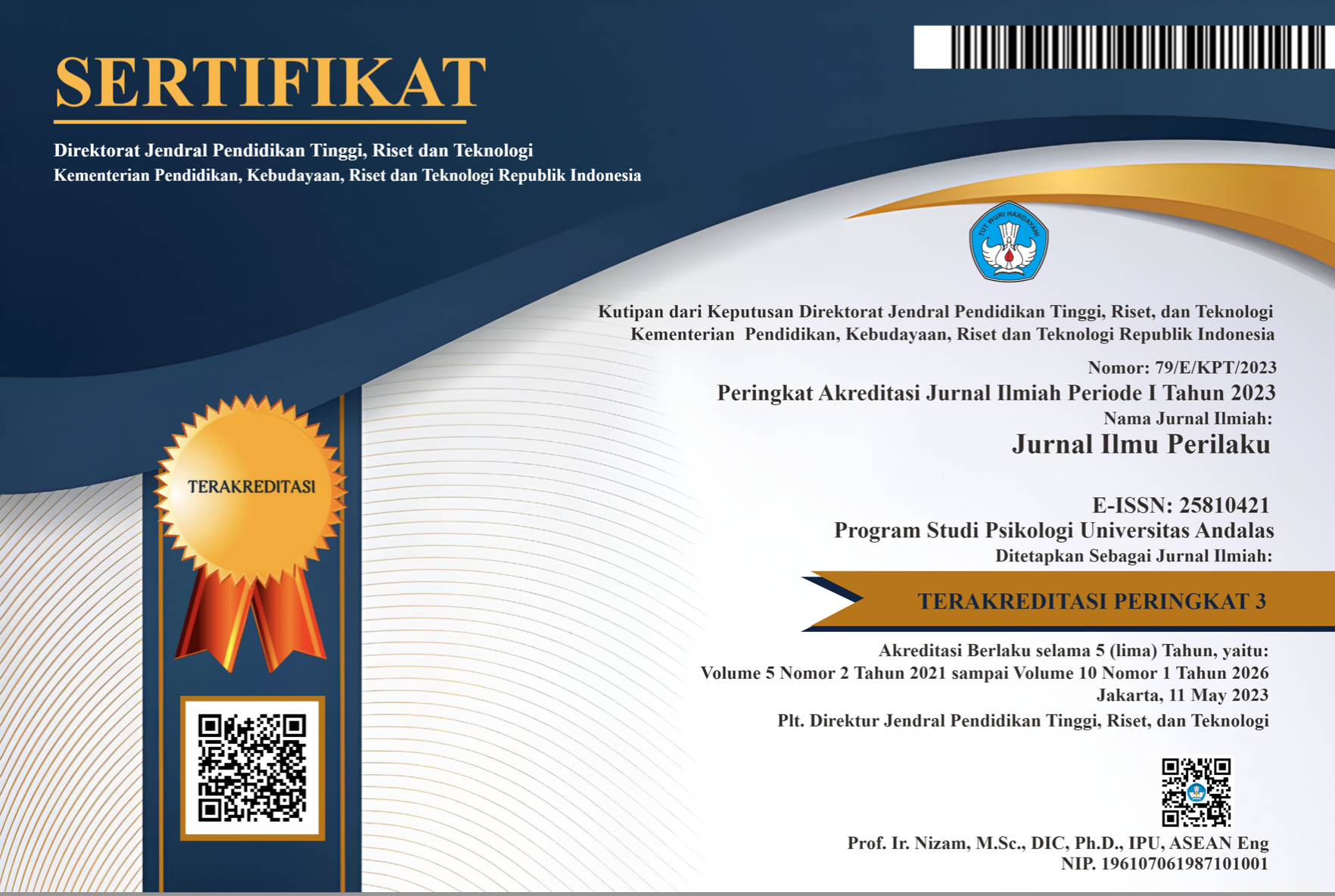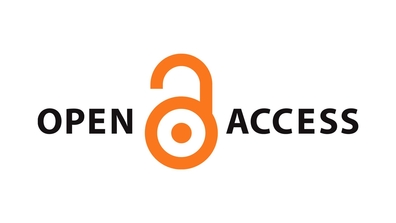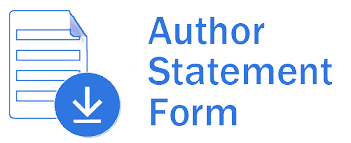Kajian Stres pada Mahasiswa: Sumber Stress dan Kontribusi Strategi Koping
Abstract
Penelitian ini bertujuan untuk mengeksplorasi kondisi stres mahasiswa melalui desain penelitian cross-sectional survey. Partisipan dalam penelitian ini adalah 111 mahasiswa program studi sarjana. Instrumen dalam penelitian ini menggunakan open-ended questionnaire, perceived stress scale-10, dan brief COPE questionnaire. Data kualitatif dianalisis dengan analisis tematik. Data kuantitatif dianalisa dengan One-Way ANOVA dan Multiple Regression. Hasil penelitian menemukan bahwa: 1) permasalahan kehidupan kampus, perasaan dan pikiran negatif, serta permasalahan relasi merupakan situasi sulit yang dihadapi oleh mahasiswa; 2) sebanyak 49,5% mahasiswa menunjukkan tingkat stres pada kategori rendah dan 50,5% mahasiswa menunjukkan tingkat stres pada kategori tinggi; 3) strategi koping dapat memprediksi stres secara signifikan; dan 4) strategi koping jenis positive reframing dan active coping dapat memprediksi penurunan stres, sedangkan strategi koping jenis self-blame dan self-distraction dapat memprediksi peningkatan stres. Intervensi psikologis yang berkaitan dengan strategi koping aktif dan berpikir positif diperlukan untuk membantu mahasiswa menghadapi permasalahan akademik, emosional, dan sosial.
Downloads
References
Asturias, N., Andrew, S., Boardman, G., & Kerr, D. (2021). The influence of socio-demographic factors on stress and coping strategies among undergraduate nursing students. Nurse Education Today 99, 104780, doi: https://doi.org/10.1016/j.nedt.2021.104780.
Awoke, M., Mamo, G., Abdu, S., & Tarefe, B. (2021). Perceived stress and coping strategies among undergraduate health science students of Jimma University Amid the COVID-19 outbreak: Online cross-sectional survey. Frontiers in Psychology 12: 639955, doi: 10.3389/fpsyg.2021/639955.
Carver, C.S. (1997). You want to measure coping but your protocol’s too long: Consider the brief COPE. International Journal of Behavioral Medicine 4, 92-100.
Carver, C.S., Scheier, M.F., & Weintraub, J.K. (1989). Assessing coping strategies: A theoretically based approach. Journal of Personality and Social Psychology 56(2), 267-283.
Christner, R.W., Mennuti, R.B., & Whitaker, J.S. An overview of school-based mental health practice from systems service to crisis intervention. in Christner, R.W., & Mennuti, R.B. (2019). School-based Mental Health: A Practitioner’s Guide to Comparative Practices. New York: Routledge, Taylor & Francis Group.
Eva, N., Parameitha, D.D., Farah, F.A.M., & Nurfitriana, F. (2021). Academic resilience and subjective well-being amongst college students using online learning during the COVID-19 pandemic. KnE Social Sciences, 4(15), 202-214, doi: https://doi.org/10.18502/kss.v4i15.8206.
Fitriyana, S., Respati, T., & Sartika, D. (2021). The source of stress of students during pandemic COVID-19: a Qualitative study. Global Medical and Health Communication, 9(1), 76-80, doi: https://doi.org/10.29313/gmhc.v9i1.6938.
Haq, W.M., Djunaidi, A., & Yuanita, R.A. (2021). Pengaruh coping stress dan college adjustment terhadap academic achievement pada mahasiswa Unpad tingkat pertama. Proviate: Jurnal Psikologi Pendidikan 14(1), 80-101.
Howitt, D., & Cramer, D. (2011). Introduction to Research Methods in Psychology (3rd ed.). Harlow: Pearson Education Limited.
Idris, I., & Pandang, A. (2018). Efektivitas problem focused coping dalam mengatasi stres belajar siswa pada pelajaran matematika. Jurnal Psikologi Pendidikan & Konseling 4(1), 63-68, doi: https://doi.org/10.26858/jpkk.v4il.5896.
Indira, I.G.A.A.E. (July 30-31, 2016). Stress questionnaire: Stress investigation from dermatologist perspective. National Symposium and Workshop: Psychoneuroimmunology in Dermatology. Bali: Indonesia.
Kaligis, F., Indraswati, M.T., & Ismail, R.I. (2020). Stress during COVID-19 pandemic: Mental health condition in Indonesia. Brief Communication, 29(4), 436-41, https://doi.org/10.13181/mji.bc.204640.
Kumanova, M., & Karastoyanov, G. (2013). Perceived stress and coping strategies. 3rd Annual Conference “Education, Science, Innovation” (June 9-10). Pernik, Bulgaria: European Polytechnical University.
Maulana, H.A. (2021). Psychological impact of online learning during the COVID-19 pandemic: A case study on vocational higher education. Indonesia Journal of Learning Education and Counseling, 3(2), 130-139, doi: https://doi/org/10.31960/ijolec.v3i2.833.
Mujahidah, N.E., Astuti, B., & Nhung, L.N.A. (2019). Decreasing academic stress through problem-focused coping strategy for junior high school students. Psychology, Evaluation, and Technology in Educational Research 2(1), 1-9, doi: http://dx.doi.org/10.33292/petier.v2i1.25.
Nursadrina, A.N., & Andriani, D. (2020). Gambaran coping strategies pada mahasiswa Universitas Padjadjaran. Journal of Psychological Perspective 2(1), 1-11.
Okoro, R.N., Biambo, A.A., & Jamiu, M.O. (2021). Perceived stress and its predictors, stressors, and coping strategies among undergraduate pharmacy students in northern Nigeria. Currents in Pharmacy Teaching and Learning 13, 804-811, doi: http://dx.doi.org/10.1016/j.cptl/2021.03.014
Pedrotti, M., & Nistor, N. (2019). How students fail to self-regulate their online learning experiences in Scheffel, M., Broisin, J., Pammer-Schindler, V., Loannou, A., & Schneider, J. (2019). Transforming Learning with Meaningful Technologies. 14th European Conference on Technology Enhanced Learning (September 16-19, 2019). Delft: the Netherlands.
Shaughnessy, J.J., Zechmeister, E.B., & Zechmeister, J.S. (2015). Research methods in psychology (10th ed.). New York: McGraw Hill Education.
Straud, C.L., & McNaughton-Cassill, M. (2018). Self-blame and stress in undergraduate college students: The mediating role of proactive coping. Journal of American College Health, doi: https://doi.org/10.1080/07448481.2018.1484360.

This work is licensed under a Creative Commons Attribution-NonCommercial-ShareAlike 4.0 International License.
The non-commercial use of the article is governed by the Creative Commons Attribution license as currently displayed on Creative Commons Attribution-NonCommercial-ShareAlike 4.0 International License.
JIP's spirit is to disseminate articles published are as free as possible. Under the Creative Commons license, JIP permits users to copy, distribute, display, and perform the work for non-commercial purposes only. Users will also need to attribute authors and JIP on distributing works in the journal.
Please find the rights and licenses in Jurnal Ilmu Perilaku (JIP).
- License
The non-commercial use of the article will be governed by the Creative Commons Attribution license as currently displayed on Creative Commons Attribution-NonCommercial-ShareAlike 4.0 International License.
- Author’s Warranties
The author warrants that the article is original, written by stated author(s), has not been published before, contains no unlawful statements, does not infringe the rights of others, is subject to copyright that is vested exclusively in the author and free of any third party rights, and that any necessary written permissions to quote from other sources have been obtained by the author(s).
- User Rights
JIP's spirit is to disseminate articles published are as free as possible. Under the Creative Commons license, JIP permits users to copy, distribute, display, and perform the work for non-commercial purposes only. Users will also need to attribute authors and JIP on distributing works in the journal.
- Rights of Authors
Authors retain the following rights:
- Copyright, and other proprietary rights relating to the article, such as patent rights,
- The right to use the substance of the article in future own works, including lectures and books,
- The right to reproduce the article for own purposes, provided the copies are not offered for sale,
- The right to self-archive the article.
- Co-Authorship
If the article was jointly prepared by other authors, the signatory of this form warrants that he/she has been authorized by all co-authors to sign this agreement on their behalf, and agrees to inform his/her co-authors of the terms of this agreement.
- Termination
This agreement can be terminated by the author or JIP upon two months’ notice where the other party has materially breached this agreement and failed to remedy such breach within a month of being given the terminating party’s notice requesting such breach to be remedied. No breach or violation of this agreement will cause this agreement or any license granted in it to terminate automatically or affect the definition of JIP.
- Royalties
This agreement entitles the author to no royalties or other fees. To such extent as legally permissible, the author waives his or her right to collect royalties relative to the article in respect of any use of the article by JIP or its sublicensee.
- Miscellaneous
JIP will publish the article (or have it published) in the journal if the article’s editorial process is successfully completed and JIP or its sublicensee has become obligated to have the article published. JIP may conform the article to a style of punctuation, spelling, capitalization, referencing and usage that it deems appropriate. The author acknowledges that the article may be published so that it will be publicly accessible and such access will be free of charge for the readers.










